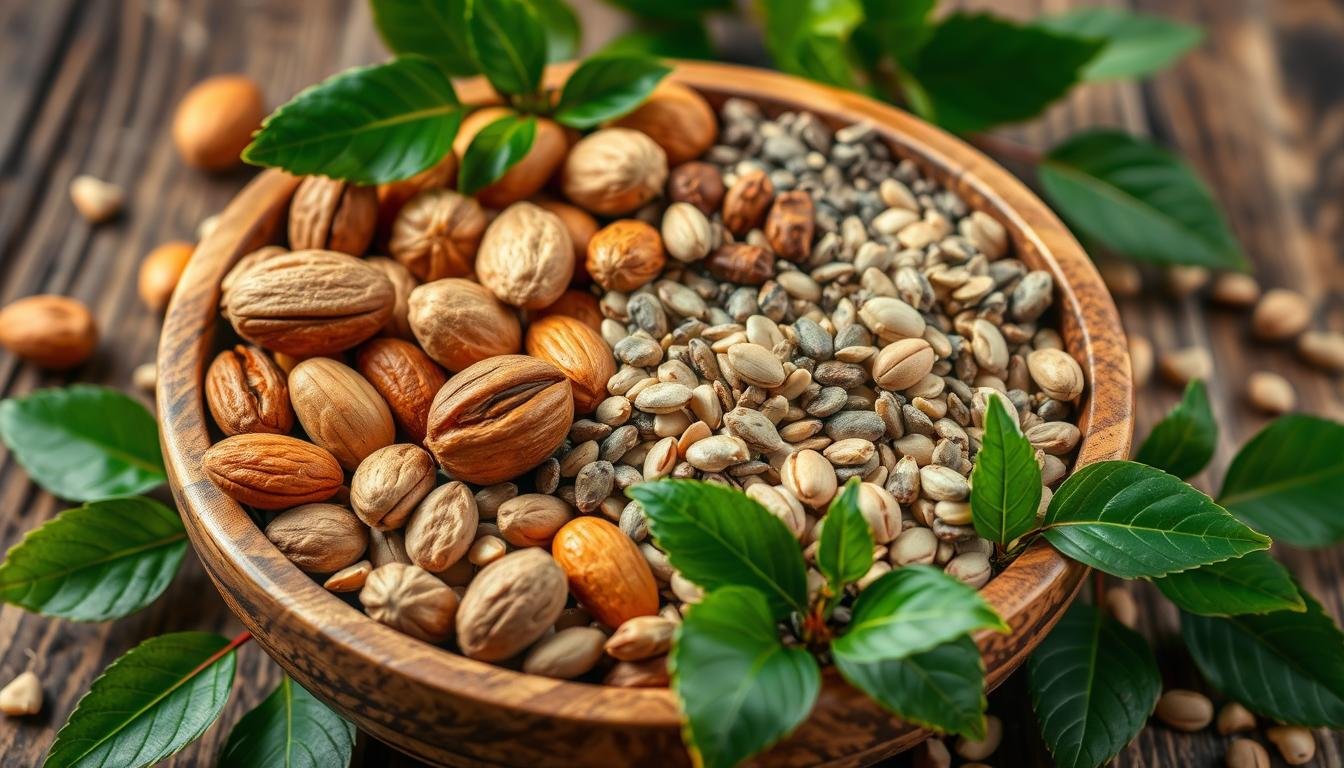Over 34 million Americans live with diabetes today. This highlights an urgent need for effective ways to manage it. Supplements are becoming key in helping with blood sugar control. They show promise alongside traditional methods. This article looks into recent research. It explores how supplements could help in a complete diabetes management strategy.
Key Takeaways
- Diabetes affects over 34 million Americans, highlighting the need for better management solutions.
- Research supports the use of supplements as a valuable tool for blood sugar regulation.
- Incorporating evidence-based supplements can enhance overall diabetes nutritional support.
- Effective diabetes management often involves a multifaceted approach, including diet, exercise, and supplements.
- Understanding the role of supplements can empower individuals in their diabetes management journey.
Understanding Diabetes and Its Challenges
Diabetes is a chronic condition that affects how the body processes glucose. It mainly appears as Type 1, Type 2, and gestational diabetes. Each type brings its own challenges that make life harder for those with the condition.
Type 1 diabetes usually starts in children or teens. It happens when the body can’t make insulin anymore. People with it must check their diabetes symptoms often and take insulin shots daily. Type 2 diabetes more often happens in adults and can be linked to being overweight and not exercising enough. They need to watch their diet closely and exercise to control their blood sugar. Gestational diabetes shows up in pregnancy and can harm both the mom and baby if not watched.
Staying on top of managing diabetes means keeping blood sugar levels steady, following a good eating plan, and avoiding serious problems like nerve damage and heart disease. These issues can hurt a person’s health and life quality. Knowing these challenges shows how important a healthy lifestyle is for those with diabetes.
The Role of Diet in Diabetes Management
Diet is key in managing diabetes, influencing overall health and blood sugar. The link between what you eat and diabetes is strong. Nutrition greatly affects your everyday life and long-term health. Carbs need careful picking since their impact on blood sugar varies.
A good diabetic diet has proteins, healthy fats, and lots of veggies. This mix keeps blood sugar stable and provides needed nutrients. It’s also important to watch how much you eat. Having small meals throughout the day helps control hunger and keeps glucose levels even.
Changing what you eat is vital in controlling diabetes, but vitamins and minerals can also help. They add extra nutrition that might help control blood sugar better. Eating well and taking the right supplements offers a full plan for managing diabetes.
Supplements for Diabetes
Many people with diabetes find supplements helpful in managing their blood sugar. These supplements add to a balanced diet, filling nutritional gaps. They aim to support blood sugar control alongside diet efforts.
How Supplements Complement a Healthy Diet
Supplements can address nutritional shortages from limited diets. Those cutting carbs might overlook vital nutrients. Diabetes supplements offer needed vitamins and minerals, aiding blood sugar management. They work with a healthy diet for better health outcomes.
Common Types of Supplements for Diabetes
Knowing about different supplements can help people choose wisely. Here are some top picks for managing blood sugar:
- Omega-3 fatty acids: These are anti-inflammatory and promote heart health, supporting stable blood sugar.
- Fiber: It slows digestion for more consistent blood sugar levels.
- Chromium: This mineral boosts insulin sensitivity, aiding in sugar control.
- Cinnamon extract: It might reduce blood sugar levels and better insulin sensitivity.
| Supplement Type | Potential Benefits |
|---|---|
| Omega-3 Fatty Acids | Supports heart health and reduces inflammation |
| Fiber | Stabilizes blood sugar and aids digestion |
| Chromium | Improves insulin response and glucose metabolism |
| Cinnamon Extract | May lower blood sugar and enhance insulin sensitivity |
Key Vitamins and Minerals for Diabetics
Managing diabetes goes beyond blood sugar checks. It includes essential vitamins and minerals in the diet. Knowing which nutrients help control blood sugar is key. Vitamins from the B family and minerals are crucial. They help manage glucose levels and support the body’s functions.
Essential Vitamins for Blood Sugar Control
Vitamin D and B vitamins are vital for controlling blood sugar. Vitamin D boosts insulin sensitivity. B vitamins help with energy and nerve health. If you don’t have enough, your metabolic health might suffer. Eating foods rich in these vitamins can improve the health of diabetics.
Minerals that Aid in Glucose Management
Magnesium and chromium are important for diabetes management. Magnesium helps with insulin sensitivity. Chromium helps control blood sugar levels. Eating foods that are good sources of these minerals can improve your health. It’s best to get these nutrients from whole foods. Natural sources include:
| Nutrient | Food Sources | Health Benefits |
|---|---|---|
| Vitamin D | Fatty fish, fortified dairy | Improves insulin sensitivity |
| B Vitamins | Whole grains, eggs, legumes | Supports energy metabolism |
| Magnesium | Leafy greens, nuts, seeds | Aids in insulin sensitivity |
| Chromium | Broccoli, oats, barley | Helps regulate blood sugar |
Always talk to a healthcare provider before starting new supplements. Focusing on whole foods is the best approach. It ensures you get the nutrients you need safely. For more tips, check out the recommended nutrients for managing diabetes.

Blood Sugar Control Supplements: Evidence and Effectiveness
Blood sugar supplements help manage diabetes effectively. Many seek to know how supplements like berberine, alpha-lipoic acid, and gymnema sylvestre work. They have unique ways to improve blood sugar levels and insulin sensitivity.
Popular Supplements and Their Mechanisms
Berberine is known for boosting insulin sensitivity and lowering liver glucose production. Alpha-lipoic acid helps by increasing glucose uptake and acting as an antioxidant. This provides dual benefits for diabetes patients. Gymnema sylvestre helps reduce sugar cravings and control blood sugar, making it a popular choice.
Research-Backed Benefits of Blood Sugar Control Supplements
Research shows that diabetes supplements can be effective. Berberine, for instance, significantly reduces fasting glucose levels. Alpha-lipoic acid is linked to better insulin sensitivity. Gymnema sylvestre reduces sugar absorption in the intestines. These findings highlight the role of supplements in diabetes management.
Herbal Remedies for Diabetes Management
Herbal remedies for diabetes are becoming popular in managing blood sugar levels. There are many natural solutions that provide potential benefits. These include traditional herbs with a long history of use. We will look at herbal extracts like bitter melon, fenugreek, and ginseng. Their properties and scientific backing will be explored.
Overview of Beneficial Herbal Extracts
Bitter melon is known for its effects similar to insulin and is a top choice for diabetes. Studies have shown that it can reduce blood sugar levels. Fenugreek seeds have soluble fiber, helping to slow down digestion and carbohydrate absorption. Ginseng is also beneficial as it helps improve insulin reaction and sugar metabolism.
Scientific Studies on Herbal Remedies
Many studies confirm the effectiveness of these herbal remedies in diabetes care. For example, research on bitter melon showed it could cut fasting blood glucose in participants. Studies on fenugreek have revealed its ability to handle diabetes symptoms well. Ginseng has shown great results in clinical trials, boosting glycemic control.

| Herb | Key Benefits | Supporting Studies |
|---|---|---|
| Bitter Melon | Lowers blood sugar levels | Significant reductions in fasting blood glucose |
| Fenugreek | Helps control diabetes symptoms | Research shows effectiveness in managing blood sugar |
| Ginseng | Improves insulin sensitivity | Positive effects documented in various clinical trials |
Looking into these herbal remedies reveals their possible role in managing diabetes. They offer new insights for those seeking natural alternatives to standard treatments. Adding herbal supplements to a diabetes care plan could lead to better health outcomes.
Nutrients for Insulin Resistance
Managing insulin resistance is key for those with Type 2 diabetes. Several factors play a part, including diet, lifestyle, and genes. Adding special nutrients for diabetes can help improve metabolic health and insulin sensitivity.
Key nutrients for those facing insulin resistance include:
- Omega-3 Fatty Acids: Found in fish oil and plant sources, they aid in lowering inflammation linked with insulin resistance.
- Fiber: Eating foods rich in soluble fiber, like in fruits, veggies, and whole grains, helps manage blood sugar and prevents overeating.
- Amino Acids: These come from protein sources and help with insulin production. They also boost muscle growth, improving glucose metabolism.
Adding these insulin resistance supplements to a balanced diet can greatly affect blood sugar control. Eating diverse whole foods rich in these nutrients aids in efficient insulin processing.
Antioxidants for Diabetics: What the Science Says
Studies show that antioxidants are key in treating diabetes. They fight oxidative stress, which many diabetics face. This stress causes damage linked with diabetes, leading to more problems. Antioxidants protect by neutralizing harmful free radicals. They can reduce inflammation and boost metabolic health too.
Role of Antioxidants in Diabetes Management
Adding antioxidants to their diet helps people with diabetes. Vitamins C and E, along with coenzyme Q10 and alpha-lipoic acid, are beneficial. They reduce damage from diabetes by managing blood sugar levels. This improves health and may lessen disease complications. Checking out research on antioxidants can provide valuable insights.
Popular Antioxidant Supplements and Their Benefits
Several supplements with antioxidants are under study for diabetes benefits. Alpha-lipoic acid is notable for boosting insulin sensitivity and fighting stress. Coenzyme Q10 supports heart health, crucial for diabetics. People looking into supplements should talk to a doctor first. For more on boosting metabolism, consider exploring biotin tablets too.

Natural Diabetes Treatments: A Holistic Approach
Embracing natural diabetes treatments means adopting a whole-person approach. It combines changes in lifestyle and diet with the right supplements. This method looks at the many sides of diabetes, creating personalized plans.
Exercise is key in managing diabetes. Being active helps with weight and improves how well insulin works. Adding activities like walking, yoga, or weight training can make a big difference in blood sugar levels. Integrative diabetes solutions also show how managing stress with mindfulness or meditation helps. It boosts emotional health and keeps blood sugar more stable.
Making smart food choices is critical. Eating foods that are whole and balanced supports your health. Lean proteins, whole grains, veggies, and good fats are essential. Adding certain supplements might also help, especially those that help with blood sugar.
Creating a detailed plan that involves these elements can lead to better diabetes control. A routine that covers eating well, staying active, and being mentally healthy leads to a better life.
| Strategy | Description |
|---|---|
| Exercise | Regular physical activity improves insulin sensitivity and overall health. |
| Stress Management | Techniques such as mindfulness and meditation promote emotional well-being. |
| Diet | A balanced diet rich in whole foods supports blood sugar control. |
| Supplements | Natural supplements may enhance diabetes management and overall health. |
Glucose Management Supplements: Key Players
Many people are now using glucose management supplements to help control their blood sugar. With so many options available, it’s important to look at each one carefully. This review will cover the top supplements for managing diabetes and their effects on blood sugar levels.
Comparison of Various Supplements
Comparing these supplements involves looking at their ingredients, dosage, and manufacturer claims. Here’s a table showing some popular choices and what they offer.
| Supplement Name | Key Ingredients | Proposed Benefits | Typical User Rating |
|---|---|---|---|
| Berberine | Berberine extract | May improve insulin sensitivity | 4.5/5 |
| Cinnamon Extract | Cinnamon polyphenols | May lower fasting blood glucose | 4.3/5 |
| Alpha-Lipoic Acid | Alpha-lipoic acid | May enhance glucose uptake | 4.6/5 |
| Chromium Picolinate | Chromium | May support insulin function | 4.2/5 |
Patient Experiences and Testimonials
People love sharing how glucose management supplements have helped them. These real stories can offer insights into the supplements’ impacts. Many have seen better blood sugar levels after adding these products to their routine.
“Since I started using berberine, my fasting glucose levels have significantly improved. It’s become an essential part of my routine.”
“Cinnamon extract has made a noticeable difference in how I feel throughout the day. I experience fewer sugar crashes!”
Hearing from those who’ve tried them can help you decide if a supplement is right for you. Working with a professional to pick the right supplements can make managing your blood sugar easier.
Botanical Extracts for Glycemic Control
Plant-based supplements are becoming popular for diabetes management and improving blood sugar control. These botanical extracts can be really helpful. They play a key role in helping manage diabetes.
Popular Plant-Based Extracts Studied
Curcumin from turmeric is great because it fights inflammation and might help with insulin sensitivity. Green tea extract, which is full of antioxidants, helps with blood sugar management by impacting glucose metabolism. Beetroot, known for boosting blood flow, is also researched for its benefits in controlling blood sugar.
Benefits and Risks of Using Botanical Supplements
Using plant extracts for diabetes can increase insulin sensitivity and lower blood sugar. But, people should know about possible drug interactions or side effects, especially with high doses. It’s important to keep researching to make sure these treatments are safe and effective. For thorough information, check the studies here.
Consultation with Healthcare Professionals
Starting a supplement regimen for diabetes can greatly affect your health. It’s vital to talk with healthcare professionals first. They help create a safe and helpful supplement plan tailored to you.
Importance of Medical Guidance Before Starting Supplements
Before trying new supplements, reaching out to healthcare experts is a must. They check if the supplements are safe and won’t mix badly with any medications. These skilled people can spot health issues that need careful consideration with supplements.
Integrating Supplements into a Treatment Plan
Adding supplements to your diabetes care should be done carefully. Working with doctors, dietitians, and pharmacists ensures a well-rounded plan. This teamwork keeps all diabetes care angles covered, leading to better management and results.
Staying Informed: Latest Research on Diabetes Supplements
For people with diabetes, it’s vital to keep up with the latest findings on diabetes. New research on diabetes supplements offers important insights. These insights help in the daily management of diabetes. Studies highlight the importance of vitamins in controlling inflammation, antioxidation, and lipid metabolism.
Learning about these supplements empowers people to make better health decisions. Research suggests vitamins A, B, C, and E could be beneficial. Yet, the impact varies, and more studies are needed for dosage and treatment interactions. A look at the latest research shows the complex role of nutrients in managing diabetes.
Those managing diabetes should regularly check for new studies. Staying informed helps people understand which supplements are helpful. As science progresses, evaluating new data is key to incorporating good practices into daily life.
| Vitamin | Role in Diabetes Management | Recommended Daily Intake |
|---|---|---|
| Vitamin A | Supports immune function and may reduce complications | 900 mcg |
| Vitamin B | Helps with energy production and may improve glucose levels | Varies by type (2.4 mcg for B12) |
| Vitamin C | Acts as an antioxidant, potentially lowering blood sugar levels | 90 mg |
| Vitamin E | Might protect against oxidative stress | 15 mg |
Staying up-to-date with diabetes supplements research is crucial. It lets people use the latest findings to improve health and diabetes management.
Conclusion
Diabetes supplements have a big role in managing the disease well. This article showed how certain nutrients and plant extracts help. They improve blood sugar levels, fight insulin resistance, and offer antioxidant benefits. Adding these supplements to your treatment can help your health a lot.
For those looking to improve their diabetes care, these tips are key. It’s vital to work with doctors to find the right supplements for you. This team effort helps patients feel confident and knowledgeable on their journey.
In the end, supplements are an important part of treating diabetes. They should be used alongside lifestyle changes and medical treatments. This approach leads to better blood sugar control and a better quality of life.


